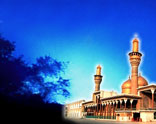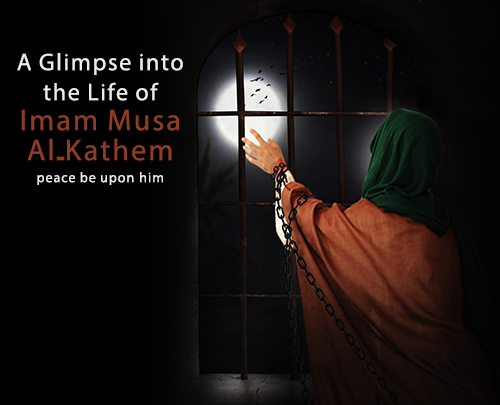In 148 AH following the martyrdom of Imam Jafar Sadiq (a.s.), Imam Mousa Kazim (a.s.)
was formally invested with divine trust, at a time when the Umma of his ancestor
was passing through a crucial phase. The ruling caliphs had usurped power solely
by blood and fire, and were total strangers to the message and teachings of
Prophet Mohammad (pbuh&hh) whose mantle they claimed. To make up this
shortcoming and to keep the people away from the path of those whom the Almighty
has chosen for leadership, they encouraged jurists of questionable standing to
form sects and sectarian schools.
Imam Mousa Kazim (a.s.) was heir to the Prophet's pristine Sunna, and aware of
the dangers of divisive tendencies, ably shouldered the task of carrying on the
mission of his forefathers. In the time of Mansour Dawaniqi, he kept a low
profile but nonetheless consolidated the circle of close associates around him.
He soon won acclaim as "Kazim" which means "restrainer of anger".
The Imam enlightened his followers on the dynamics of monotheism and the powers
of reason and intellect in order to combat the wayward philosophical ideas and
atheist tendencies infiltrating the minds of the Umma. He trained over 300
scholars of repute who wrote books on various branches of Islamic science.
Perhaps the greatest of them was Hisham bin Hakam.
After Mansour's death, his successor Mahdi Abbasi, ever jealous of the Prophet's
descendants subjected Imam Kazim (a.s.) to oppression and had him brought to
Baghdad. In Baghdad the 7th Imam engaged in debates the court jurists and
representatives of various schools of thoughts, and exposed their fallacies.
The people began to realize that the genuine Mohammadan Islam lay with the
Ahl-ul-Bayt and not with the court sanctioned schools of jurisprudence which
were then beginning to emerge and splinter the Umma into sects.
An alarmed Mahdi, aware of the flimsy claims of his own house to the leadership
of Muslims, put Imam Kazim (a.s.) into prison. Later he was released and sent
back to Medina. The Caliph was scheming against the Imam's life when his own
accursed lifespan was cut short by the cold hands of death. He was succeeded by
his son Mousa Hadi, who during the one-and-a-half year rule stepped up the
persecution of the Prophet's descendants, resulting in the tragedy of Fakh.

















